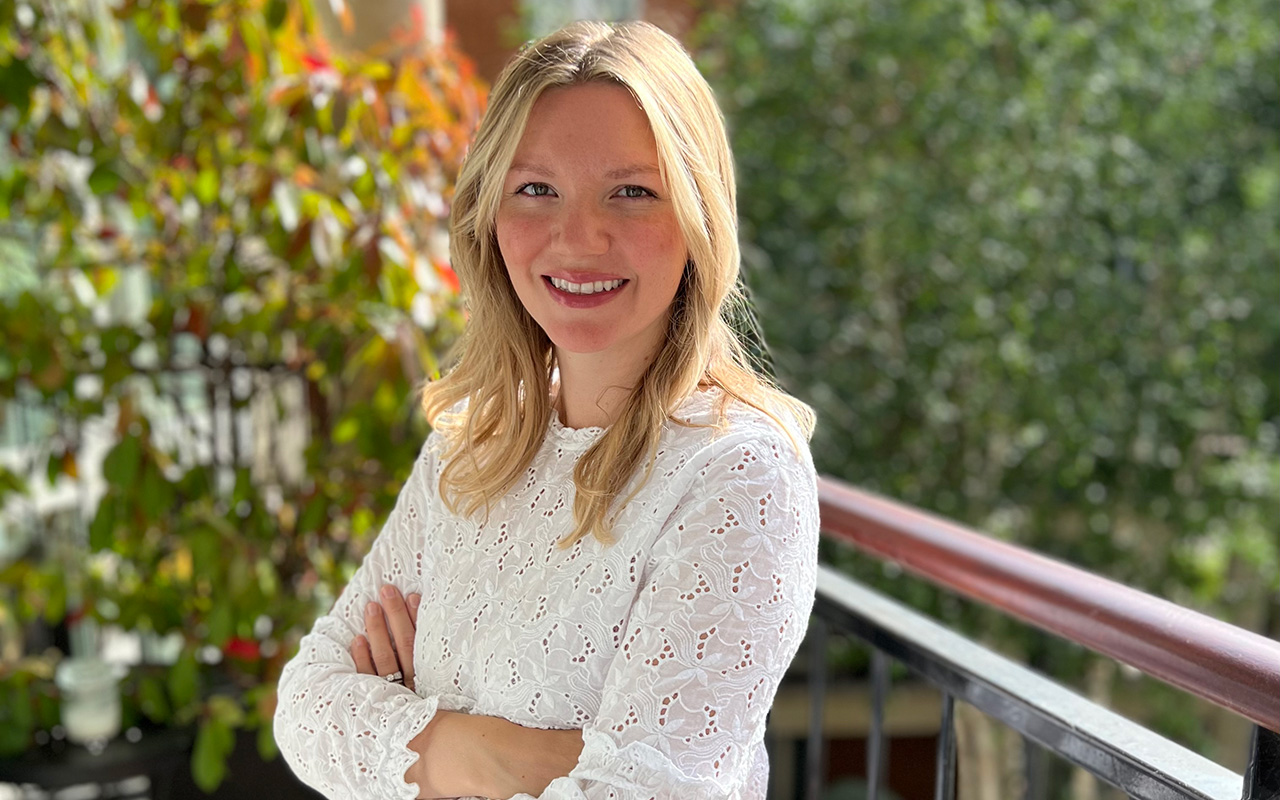With
Nicole Wiley, Chief Operating and Development Officer, 100WF
Johanna Conil-Lacoste, Manager of the UK market at Clarity AI, a sustainable finance tech platform.
Michele Gulitti, Global Director of marketing and communications, 100WF
Michiel Perry, Programming, event, and marketing strategist, 100WF
This interview originated with an inbound email from Johanna, seeking connection within the 100 Women in Finance Community, as she—like many of our members and staff—strives to strike-elusive balance between family and our professional goals. These discussions are vital as we collectively seek to build a more gender-diverse finance industry and build our individual and collective pathways to success. We invite our members to continue this dialogue — in person, at our events, on our Community Board or to submit your stories to us.
Nicole W.: Johanna, thank you for joining us today. To help frame our discussion, we would love to learn more about your career path and how you landed where you are today.
Johanna L.: Thank you. I currently work for Clarity AI in sustainable finance and I’m based in London. We are a scale-up tech company leveraging AI to bring sustainable data to the market. Clarity AI was founded by CEO Rebeca Minguela, who is a woman on a mission. Clarity prides itself on empowering investors and consumers with a toolkit that is reliable and transparent — both key factors in avoiding greenwashing. Prior to Clarity AI, I worked for Bloomberg for eight years, across multiple businesses and prior to that, I worked for a Swiss private bank in equity strategy and sales.
Nicole W.: Today, you are based in London, but you grew up in Canada. Has the lack of an extended family support structure presented any unique challenges as you’ve tried to navigate your career in finance? I’d love to hear more about your journey while trying to strike a balance between career and starting and raising a family.
Johanna L.: You raise interesting points. I’m originally from Canada and have three children, ages five, three and one. Having three children without family here definitely is a factor and makes it more challenging.
Choices in my career were driven by the fact that I wanted to be a mother. Maternity cover is one example. For example, one employer had cover that was only six weeks and limited protection for women while on leave. I remember being nervous about my client list that I had built up, as while out on leave — any of my coworkers could step in and grab those clients in my absence.
As a result, and as someone who wanted to raise a family and have a successful career, I was on a mission to find a company that would be supportive, and that’s what brought me to work for Bloomberg. Bloomberg was very supportive in that sense, and I felt protected having children and being able to continue in a career. I think for women in today’s day and age, that is a critical factor in the decision-making of our careers. Ultimately, as much as I loved my work in equity strategy, the demands of the job didn’t feel conducive to my lifestyle at the time, so I made a change to better align with my goals.
Nicole W.: Prior to joining 100WF, I spent the last 20 years at a large US-based firm, where we had 16 weeks of fully paid maternity cover. This benefit existed when my daughter was born in the summer of 2008– right before the start of the global financial crisis. This same firm has recently extended their policy to 20 weeks for U.S. employees. I was happy to receive those benefits, particularly in 2008, but recognize that that’s not a universal experience. What have you seen?
Johanna L.: There is a distinction- both by size and by geography. I was advised to move to an American firm if I wanted better support from the maternity package. The maternity package naturally helps while you are on leave. In my view, what presents the biggest challenge is having the right support in place when you’re working, to manage the children that you have. I’d say that’s the topic that isn’t spoken about enough.
Nicole W.: Let’s explore that a bit. The concept of support is multi-faceted for sure. It’s a triangulation between the support structure at home, at work and in the communities and networks we build to help solve the challenges we face each and every day. This isn’t something that any one of these pillars can singularly solve— it’s a combination and for each person, this right combination is likely to vary. There is no one-size-fits all option, for sure, but what are your thoughts on how we can better approach these challenges?
Johanna L.: You’re totally hitting the nail on the head. I don’t know what’s to come, in the coming years. No one can advise on what the best approach will be. What would be helpful for me to have is a network to lean into in where I can ask the questions to which I need answers.
What are the options? Which are the best types of schools? Where should you live? How do you manage hiring someone (a nanny for example)? How do you assert yourself with that person when they’re caring for your kids? All of this — this is a whole new world and job to manage.
You try to network and knowledge share, but there needs to be a better mechanism where all of this knowledge can be cascaded in the global village. Some of this is at work, some of this is in mother’s groups, some of it is in networking groups — but it’s fragmented, for sure.
Nicole W.: I couldn’t agree more. My daughter isn’t so little anymore — she is 14 — but it seems, in many respects, like I’ve cobbled together my entire parenting/professional experience. The result is a mosaic and I’d be lying if I said it was thoughtfully curated- it was the net result of survival. Much of what I have learned about functioning and thriving as a working mom is a direct result of putting myself out there as much as possible- asking questions, learning as I go and sharing what I know. It’s an imperfect practice. In my role, I meet a lot of people in a lot of places, with diverse perspectives, and, in many cases, my most important role is to connect those who should be in discussion. I think that may be the starting point of much of this — we all need to listen, be observant and connect.
Johanna L.: I agree. When we gather at events, and people can speak about their experiences to a broader group in a wider forum, I think it would be helpful, like you’re saying, to share knowledge. So many of our members are living these experiences every day and have so much to share.
Nicole W.: We have two other working mothers with us today who have also navigated the challenges of professional lives and multiple children. Michele, I’d love to hear your perspective.
Michele G: I had three children under three years of age at one time. So when you were talking about your four-year span, for a month and a half, I had three children under the age of three. Now they are nine, 11 and 12. I joined 100 Women in Finance in March of 2022 as part of the Marketing & Communications department after an extended leave to raise my family. I am grateful to the organization because this is my first back-to-work position in over 10 years. This opportunity offers me the flexibility to work from home and to keep an untraditional schedule so that I may continue my home responsibilities while juggling work deadlines.
For women who choose to stay home when they’ve had their children, the other big component is how do you get back into work after you’ve had such a long period of time outside of work? Because things have changed too. Prior to my work sabbatical I was working in banking, so many of the systems I was using have changed, along with regulations.
COVID-19 has dramatically changed the perception of working from home; it’s great we have the flexibility now. This has been a game-changer for so many capable professionals, in my view. For instance, we’ve been sharing the flu in my house for the last two weeks, but now I can work from home. Prior to a work-from home-arrangement, when my husband and I both worked in this city, there would’ve been no way that we could say, “Well, which one of us is taking off today?” In this bout of the flu, my daughter was home from school for a whole week- this could have been a deal-breaker for me and many others just a few years ago…
Nicole W.: Michiel, you’ve just recently joined 100WF and have spent your career as an entrepreneur as well as in the technology, public affairs and government sectors — with two small children. What is your point of view, having seen how other professional sectors navigate these challenges?
Michiel P.: My children are young. One of the biggest challenges I had was the two- and three-year wait lists for all the preschools that everybody wants to go to. This was jarring to me — and ultimately, we were driving an hour to two different preschools just for our children to get interaction. There was a point when we were on 30 wait lists within an hour radius of our home and putting down additional deposits just in case. It was only a month ago when we could get both of our children into the same school.
At the time, I was running my business, and I had that flexibility; however, I know that most people don’t have that level of flexibility but the limited access to child care and pre-schools is known to many. Public affairs is certainly a different space than finance. What stands out from my experience in public affairs is that it is very common to see children and families at events in politics, but I note that politics is a 24/7 job. So you could bring kids to galas, but I know that’s not the case in every industry. It was very normal because the members of congress set the tone. They’re bringing their family and their kids. So as long as your boss was doing that, generally that was very normal.
So that was one of those things — I do wish it was more normal in other places to bring family to things, conferences and galas where there were always children around. The tech space was the same way with Google, where people would work 24/7, even the engineers, but everyone did it: the men and the women. It’s hard unless the company just makes that the standard.
Nicole W.: I suspect this is just the beginning of what I hope to be an evolving dialogue. Thank you all for your candor today and we invite all of our members to join the conversation at our events and on our Community page.

